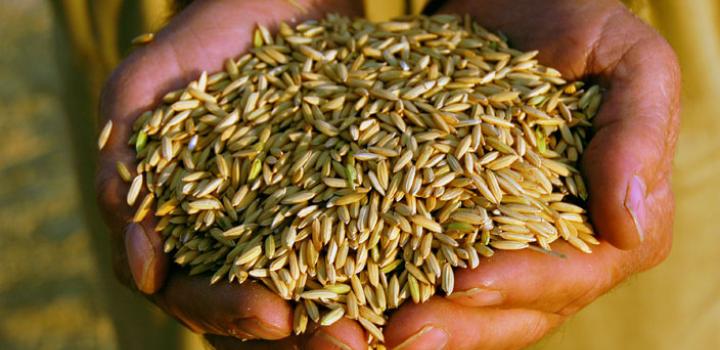Arkansas rice farmers among the first in the U.S. to receive carbon credits for sustainable practices
by June 14, 2017 5:41 pm 1,471 views

Seven farmers across the country – four in Arkansas – received the first carbon credit issued to rice farmers Wednesday, according to the United States Department of Agriculture.
The credit was primarily issued due to reductions in methane produced, farmer Mark Isbell told Talk Business & Politics. His family’s farm about 12 miles west of Stuttgart was one of the seven.
“We look at it as a win for everyone,” Isbell said. “It’s a family enterprise. We’re very grateful.”
The amount of the credit was not released. Isbell said he’d been told about the article released by the USDA, but he hadn’t read it yet. The sale of the carbon offset credits, managed by Terra Global Capital, to Natural Capital Partners on behalf of its client Microsoft, rewards farmers credibly measured environmentally beneficial practices, according to USDA.
“Being the first of a kind emission reductions from sustainable rice production, Microsoft valued the innovation by farmers and the investment in technology to catalyze measuring and monitoring emission reductions,” Microsoft Chief Environmental Strategist Rob Bernard said.
Farmers from California and Mississippi were part of the project. A diverse group of like-minded partners guided the farmers through the process, including Terra Global Capital, American Carbon Registry (ACR), USDA Natural Resources Conservation Service (NRCS), California Rice Commission, White River Irrigation District and the Environmental Defense Fund (EDF). This public private partnership was funded by NRCS under the Conservation Innovation Grants (CIG) program and Entergy Corporation, an integrated energy company, through its Environmental Initiatives Fund.
Through a voluntary rice protocol developed by the ACR, rice growers in the Sacramento Valley of California and the Mid-South (Texas, Arkansas, Mississippi and Louisiana) can implement voluntary conservation management practices on their land that reduce methane.
Isbell’s grandfather, Leroy Isbell, and his father, Chris Isbell began leveling their rice fields to zero-grade in the late 1970s. Many rice farmers use levee systems and often it leaves fields uneven, Riceland Foods Inc. Vice President for Governmental Affairs Kevin McGilton told Talk Business & Politics. Zero-grade allows farmers to use less water, he said. It’s estimated a zero-grade field uses up to 60% less water, according to estimates. Water can be drained into ditches and then into a reservoir instead of just draining into a creek or river. The reservoir allows for the water to be reused, he said. It has secondary environmental impacts, too. It reduces water pumping costs, slashes fuel usage, reduces water usage and curtails nutrient loading in downstream bodies of water.
Water conservation allowed Isbell’s family to implement a new growing method that curtails methane production. Typically, rice farmers will flood their fields mid-season and leave the water standing. It kills grass and weeds, but it stops oxygen from reaching the soil. This produces methane, Isbell said. A new technique, alternate wetting and drying helps to reduce this. Instead of fields constantly under water, they are dried almost to a “mud-like” state, he said. This allows oxygen to infuse the soil, and less methane is produced, he said.
Isbell, and the other farmers involved in the project kept meticulous records to ensure the credit requirements were met. Third party verification companies helped the farmers track their efforts, and tabulate the carbon emissions saved.
The sale of these credits helps move forward the Rice Cultivation Projects Compliance Offset Protocol, approved by the California Air Resources Board (ARB) in 2015, which allows U.S. rice farmers to generate offsets that can be sold into the California’s compliance cap-and-trade market (in addition to having access to the voluntary carbon offset market). The effort to recognize voluntary conservation and market opportunities for rice growers in the California regulatory program was spearheaded by EDF and other partners, with support through the NRCS CIG program, according to USDA.
There are other farmers in Arkansas using many of these practices, but don’t keep accurate records, McGilton said. Now that farmers can make more money by reducing water use and methane production, he thinks the practices will grow in the state in the coming years.
Isbell’s family farms about 3,000 acres, and it has done so for five generations, he said. The family plans to work with agriculture researchers to implement the best environmental practices, he said. Farmers across the state are learning new and more efficient ways to grow crops, and he thinks these innovations are only the beginning.
“It’s a testament to the hard working farmers we have throughout the south and in Arkansas,” he said.
The American Carbon Registry is an investment project of Winrock International’s American Carbon Registry.
